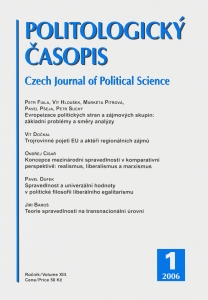Teorie spravedlnosti na transnacionální úrovni
Theories of Justice at the Transnational Level
Author(s): Jiří BarošSubject(s): Politics / Political Sciences
Published by: Masarykova univerzita nakladatelství
Keywords: political philosophy; globalisation; justice; cosmopolitanism; law of peoples; statism; globalism
Summary/Abstract: The article discusses the normative responses of the tradition of Rawls’s political philosophy to the fact that globalization is not working according to the principles of distributive justice and that the existing global distribution of income and wealth is highly unjust. The first section presents the cosmopolitan theories of Charles Beitz and Thomas Pogge, both of whom draw their concepts from Rawls’s masterpiece “Theory of Justice”. These advocates of the Rawlsian approach see our world as forming one basic global structure that entails complex economic, political and cultural relationships across state borders. These relationships have important distributive implications that require the application of Rawlsian principles of justice at the transnational level. In the second part, Rawls’s work developed in “The Law of Peoples”, which is the extension of his own approach to the transnational domain, is critically examined. Its major notions (Society of Peoples, liberal and decent peoples, outlaw states and burdened societies, etc.), as well as the reasons for rejecting this approach from a cosmopolitan point of view are closely analyzed. In the third part, globalism and statism are conceived of as two main paradigms of current debate on global and international justice. The article concludes with the thesis that Rainer Forst’s conception of transnational justice may provide the possible transcendence of this opposition.
Journal: Politologický časopis - Czech Journal of Political Science
- Issue Year: XIII/2006
- Issue No: 1
- Page Range: 99-116
- Page Count: 17
- Language: Czech

